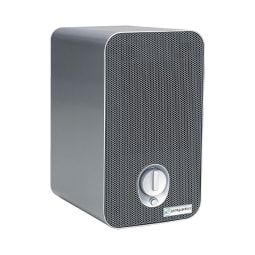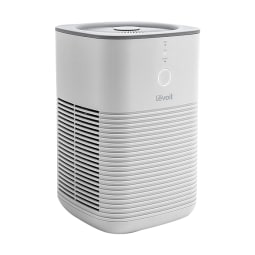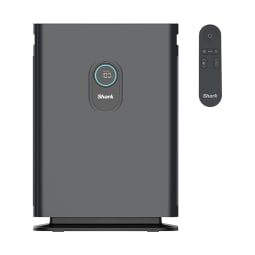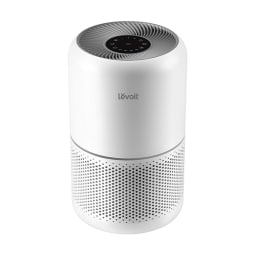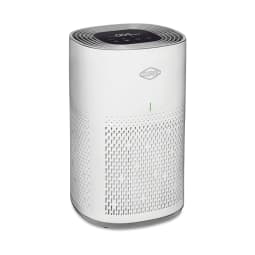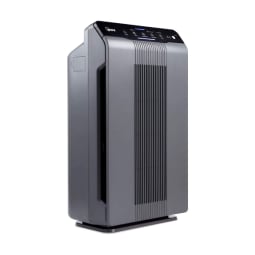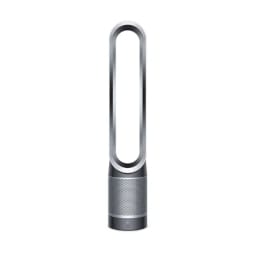The 7 Best Air Purifiers For Smoke + Signs Of Poor Indoor Air Quality


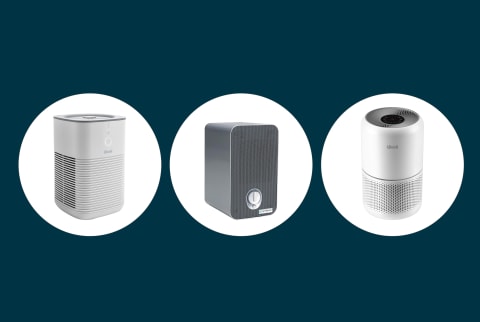
- Best budget: GermGuardian AC4100
- Best for small spaces: Levoit Small Room Air Purifier
- Best with remote control: Shark HE402 Advanced Air Purifier
- Best for large rooms: Levoit Core 300 Air Purifier
- Best quiet: Clorox Air Purifier
- Best quality: Winix 5300-2 Air Purifier
- Best design: Dyson TP01 Pure Cool
If you’ve experienced wildfire smoke creeping into your home, you know just how frustrating it can be. Studies show that wildfire smoke can cause coughing, a runny nose, and a scratchy throat1—and it's also been linked to more serious health issues, including an increased risk of heart attacks and heart failure2. Thankfully, there are a few simple ways to combat poor air quality in your home. The best air purifiers for smoke are designed to reduce the indoor pollution quickly and effectively. These air purifiers can help filter out other irritants, too, such as pet dander, mold spores, and viruses. In other words, this simple device can do big things for your health and well-being.
How does poor air quality impact health?
Shahir Fouad Masri, ScD, a specialist in air pollution exposure assessment and epidemiology at the UC Irvine Program in Public Health, emphasizes the negative impact poor air quality can have on your health.
“PM2.5 is one of the most widely studied ambient air pollutants and is well known to be harmful to human health,” he says, explaining that PM2.5 refers to tiny airborne particles, or particulate matter (also abbreviated to PM), that are smaller than 2.5 micrometers in diameter (about 1/40th the width of a strand of human hair). Smoke from fires and emissions from power plants, cars, and trucks all contain PM2.53—and perhaps surprisingly, PM2.5 may also be produced by everyday indoor activities, including candle burning, cooking, tobacco smoke, and operating fireplaces.
“In general, PM2.5 is associated with chronic respiratory health effects, such as asthma, COPD, cardiovascular disease, and lung cancer,” Masri adds. “Even acute, or short-term, exposure, such as wildfire pollution, is known to exacerbate the symptoms related to underlying health conditions, such as those mentioned previously.” In fact, he says wildfire smoke has also been linked to spikes in hospital admissions.
How do wildfires impact air quality?
Unfortunately, wildfires can have a detrimental effect on air quality. Per Masri, wildfires inject large amounts of harmful gasses and particulate matter (PM) into the atmosphere. Thankfully, Masri comes bearing good news, too. “Running an air purifier, particularly during a wildfire smoke episode, can be very effective at reducing levels of PM2.5 in the home and workspace by 50% or more,” he says. If you're stressed about the impact frequent wildfires could be having on your well-being, an air purifier could be a great way to keep your home healthier.
Signs of poor air quality
Our senses, such as sight and smell, can often help pick up on bad air quality, especially when it comes to smoke. “With wildfires, the signs of poor air quality are fortunately quite visible in the form of smoke and/or haze,” Masri agrees. “This is also the case for cities that are particularly air polluted.”
Masri explains that pollutants, including PM2.5, may not be visible to the naked eye—but they do scatter light. “When [pollutants] accumulate in the atmosphere, we can see reductions in visibility over long distances, as well as brownish or yellow tints in the air,” he explains, reiterating that your nose can be a good detector of air pollution from wildfire smoke. “Wildfire smoke, for instance, also carries an odor,” he says. “Here in southern California, I can often smell a nearby wildfire before I can see the smoke or haze.”
In terms of physical symptoms, throat irritation, headaches, dizziness, fatigue, and respiratory issues can all indicate that the air quality in your home is not great.
How do air purifiers work for smoke?
How an air purifier filters out things like smoke depends on how the device is designed. “Mechanical purifiers, such as HEPA filter-based purifiers, which I recommend, work by way of particle impaction,” Masri says. “That is, a very fine filter is used—paired with the proper flow rate—to ensure that particles passing through the filter will become impacted on its surface, thus being removed from the air.”
On the other hand, ionic filters, which Masri does not recommend, do not actually use any filters. “Instead, they utilize an electric current to essentially turn ordinary particle pollutants into charged particles,” he explains. Particles then stick to one another, settling out of the air as they grow in size and often wind up on surfaces. “Since these devices don't have a filter, the effect is essentially to convert airborne particles into dust that is no longer airborne but still exists on surfaces around the home,” Masri adds.
How to choose the best air purifier for smoke
"When choosing an air purifier, there are many factors to consider, such as the size of the room it will be used in, the types of pollutants to be removed, and one's budget,” explains Dr. John McKeon, former emergency room doctor and CEO of Allergy Standards. It’s helpful to consider any special features you want your air purifier to have (such as an air quality sensor or remote control), as well as the type and efficiency of its filter. A purifier’s noise level, Clean Air Delivery Rate (CADR), and any certifications are also important to keep in mind. “We recommend doing some research and comparing the features and performance of different air purifiers to find one that meets your specific needs and preferences,” McKeon adds.
Masri recommends sticking with purifiers that are equipped with a HEPA filter, stressing again that ionic purifiers (also advertised as electronic air purifiers) should be avoided. “Avoid buying ionic air purifiers as they can create ozone, another air pollutant,” he says. “They can also allow contaminated particles to remain on surfaces in the home.”
Both experts share that some of the best air purifiers have noteworthy certifications, such as those from the California Air Resources Board (CARB), or contain the Asthma & Allergy Friendly Certification Mark.
Our picks for the best air purifiers for smoke:
Pros:
- Compact
- Equipped with UV-C light that helps kill airborne viruses
- Pre-filter traps dust and hair
Cons:
- Small coverage area
Type:
HEPA filterCoverage area:
78 square feetWhen to replace filters:
6-8 monthsWarranty:
Not specifiedSpecification met:
CARB CertifiedThis straightforward, easy-to-use air purifier comes recommended by Masri. He says it performs well in small-to-mid-sized rooms, specifically during wildfires. The compact device works to filter out up to 99.97% of germs, pollen, pet dander, mold spores, and more, and its UV-C light helps kill harmful airborne viruses, including influenza and rhinovirus. Its pre-filter also catches dust, pet hair, and other large particles, which is a big help, especially for pet owners.
An expert-recommended charcoal filter helps this purifier remove unwanted odors from the air. The machine works exceptionally well when it comes to reducing smoke particles from indoors. “I've tested it during wildfire smoke events and have seen 50-70% reductions in PM2.5 with the doors and windows closed,” Masri adds.
Pros:
- Aromatherapy feature
- Lightweight
- Intuitive single button control
Cons:
- Highest level is loud
Type:
HEPA filterCoverage area:
322 square feetWhen to replace filters:
6-8 monthsWarranty:
2-yearSpecification met:
ETL CertifiedCARB CertifiedEPA CertifiedThis tabletop option can easily be placed on desks, counters, nightstands, and other small spaces. It boasts a three-stage dual-filter design equipped with dual-sided H13 True HEPA filters to help filter out 99.97% of airborne particles. What's more, the entire device clocks in at just around three pounds—so no sweat if you need to move it from room to room. You could even take it on trips!
Light sleepers or those looking for a no-fuss system can rest easy; this unit is whisper-quiet and has a single-button control. The machine will alert you when its filter needs to be replaced, typically every six to eight months. Another key feature: This pick has an aromatherapy pad where you can add a few drops of essential oils to create a spa-like experience at home. Reviewers love the way this purifier eliminates odors and leaves their air with a fresh, clean scent. Many mention using the device to filter smoky air from wildfires.
Advertisement
Pros:
- Has Clean Sense IQ tracker
- Comes with remote control
- Sleek design
Cons:
- Power LED can sometimes be finicky
Type:
HEPA filterCoverage area:
1,000 square feetWhen to replace filters:
Not specifiedWarranty:
2-yearSpecification met:
CARB CertifiedShark may be best known for its top-rated vacuums, but the brand also makes high-quality air purifiers. This remote-controlled model has Clean Sense IQ, which allows it to keep tabs on the air quality of a room and auto-adjust according to pollution levels. There's also an easy-to-read panel that displays real-time feedback on air quality. The display screen can be dimmed or shut off during the night to avoid sleep interruptions.
The device can cover up to 1,000 square feet and comes with a Nanoseal HEPA air filter, which the brand says removes up to 99.98% of particles. The filter has an advanced odor guard to help eliminate odors from pets, cooking, and more.
This space-saving pick is applauded for its sleek design and ability to improve the quality of dusty, odorous air quickly. “Been using it for well over a year, and I've noticed the dust in the house has been minimal since purchase. Great product, highly recommended,” shared one shopper. Another elated customer commented, “The noise level was minimal, and energy efficiency was fantastic! Didn’t use the remote. Live in El Dorado Hills, California, and was purchased during the Caldor fire. Was a lifesaver. Since then have been used during winter to help with stuffiness and furnace, also now spring and allergy season. Best money spent by far.”
Pros:
- Small size
- Affordable filter replacements
- Very quiet sleep mode
- Has a timer
Cons:
- No top handle for easy moving
Type:
HEPA filterCoverage area:
1,095 square feetWhen to replace filters:
6 monthsWarranty:
2-yearSpecification met:
Energy Star CertifiedETL CertifiedCARB CertifiedEPA CertifiedIf you need an air purifier for a large room, this one's for you. Available in creamy white and black shades, this highly-rated air purifier can cover up to 1,095 square feet. In fact, the brand claims that it can totally purify the air in a room this size in under 60 minutes. Its timer allows you to set it for run times of either 2, 4, 6, or 8 hours, and its small size allows it to go undetected in rooms easily.
The best part? This device is both Energy Star and CARB Certified. It also has a three-layer filtration system: a pre-filter that captures dust and pet hair, an H13 True HEPA filter that works to eliminate bacteria, smoke particles, pollen, and pet dander, and a high-efficiency activated carbon filter that removes smoke, fumes, VOCs, and odors.
Boasting nearly 64,000 5-star ratings, this compact pick is a favorite among many shoppers. One says it's "worked wonders" for clearing wildfire smoke, and others rave that the purifier helps improve their breathing significantly.
Advertisement
Pros:
- Very quiet
- Real-time air quality feedback display
- Has an auto-mode
Cons:
- No UV light function
Type:
HEPA filterCoverage area:
1,000 square feetWhen to replace filters:
6-12 monthsWarranty:
Not specifiedSpecification met:
Energy Star CertifiedEPA CertifiedARB CertifiedYou may be familiar with Clorox’s cleaning products, but the trusted brand also makes air purifiers that can quickly boost the air quality in your home by filtering out wildfire smoke, pet allergies, dust, and more. Lauded for being incredibly quiet, this model is constructed with a true HEPA filter that can capture up to 99.97% of particles as small as 0.1 microns and two more filters that help grab larger particles while also reducing odors.
Perfect for medium-sized rooms, this option has a sensor that can accurately detect the current air quality in a room—it shows real-time information on a sleek digital display screen, and the purifier’s fan speed will adjust based on this. It also has a 360-degree airflow that draws in air from all parts of the room. It can completely clean the air of a 225 square foot five times each hour and filter the air of a room of approximately 1,000 square feet once every hour.
Pros:
- 3-stage filter
- Automatic sleep mode when room is darkened
- Easy setup
- Remote controlled
Cons:
- May be tricky to find replacement filters
Type:
HEPA filterCoverage area:
360 square feetWhen to replace filters:
Not specifiedWarranty:
Not specifiedSpecification met:
CARB CertifiedThere’s a reason why the Winix 5300-2 has thousands of positive reviews. This high-quality purifier works well in big and small rooms and has a three-stage cleaning system that helps to remove various allergens, like mold spores, cigarette smoke, organic chemicals, and more. Its five different speed options (sleep, low, medium, high, and turbo) is a nice detail, especially the sleep mode option. When the room darkens, the unit automatically will go into sleep mode and become dim and quiet. It’ll return to auto mode once the room has light.
Another notable feature is that this unit has an air quality indicator and a dual smart sensor that adjusts the fan speed based on how good or bad the air quality is. When the red light on its display turns on, the filter needs to be replaced. Reviewed who purchased this pick specifically to combat wildfire smoke say it does an excellent job of cleaning the air and removing odors.
Advertisement
Pros:
- Design-forward
- Doubles as a fan
- Remote controlled
- Long-lasting filter
Cons:
- Can feel tricky to move around
Type:
HEPA filterCoverage area:
600-1,000 square feetWhen to replace filters:
12 monthsWarranty:
2-yearSpecification met:
CARB CertifiedCertified Asthma & Allergy FriendlyKnown for its iconic shape, the sleek Dyson Pure Cool captures up to 99.97% of air pollutants while providing a steady, cool breeze. It's certified Asthma and Allergy-Friendly by the Asthma and Allergy Foundation of America, and comes with a remote that can be used to program it to diffused or focused airflow and between stationary or oscillating.
I (the writer!) have tested the Dyson air purifier myself, and am completely obsessed. Besides being incredibly nice to look at, it's been nothing short of a lifesaver. I finally picked this up a year ago, after admiring it from afar for what seemed like forever—and I have been using it almost daily ever since. I ran it in my apartment during the recent intense wildfire smoke we had in New York City and it helped boost indoor air quality while eliminating the unsettling smoky smell.
We love that this pick comes with different fan speeds and you can program it to blow straight ahead or rotate from side to side. It also has a magnetic spot on the top where you can securely place the remote control when you’re not using it. It’s not as quiet as other models, but it’s still a must-have product.
How we picked
Features
Many of the best air purifiers for smoke come with a wide range of extras, including air quality sensors, sleep modes, and more. We honed in on each product’s features to help inform your decision process.
Expert advice
We used expert advice and insight, such as looking for purifiers with certifications, to help guide us in choosing which air purifiers we include on the list.
Reviews
Customer reviews gave us a better idea of how these air purifiers work and any nuances to keep in mind.
Size
Whether you need an air purifier for a small home office or a larger model for a spacious living room, we highlighted a variety of devices that work well in all spaces.
Comparing the best air purifiers for smoke
| Product | Price | Coverage area | Type | Certifications | Filter replacement |
|---|---|---|---|---|---|
| GermGuardian AC4100 | $54 | 78 square feet | HEPA filter | CARB Certified | 6-8 months |
| Levoit Small Room Air Purifier | $50 | 322 square feet | HEPA filter | ETL Certified; CARB Certified; EPA Certified | 6-8 months |
| Shark HE402 Advanced Air Purifier | $220 | 1000 square feet | HEPA filter | CARB Certified | Not specified |
| Levoit Core 300 Air Purifier | $100 | 1095 square feet | HEPA filter | Energy Star Certified; ETL Certified; CARB Certified; EPA Certified | 6 months |
| Dyson TP01 Pure Cool | $330 | 600-1000 square feet | HEPA filter | CARB Certified; Certified Asthma & Allergy Friendly | 12 months |
| Clorox Air Purifier | $100 | 1000 square feet | HEPA filter | Energy Star Certified; EPA Certified; ARB Certified | 6-12 months |
| Winix 5300-2 Air Purifier | $145 | 360 square feet | HEPA filter | CARB Certified | Not specified |
FAQ:
Do air purifiers really work for smoke?
There are many air purifiers out there that can work on reducing smoke particles in the home. Be sure to read a product’s description carefully before deciding which is the best for you.
Which air purifier removes smoke smell?
Many air purifiers can help reduce or eliminate the smell of smoke. Look for those that have an extra carbon or charcoal filter layer to help with this.
How does smoky air affect health?
Smoky air can have many adverse effects on health. For instance, it has been associated with chronic respiratory health effects, including asthma, COPD, lung cancer, and more. As Masri mentioned, even short-term exposure to smoke can have negative effects on your health.
What happens if you breathe in bad air quality?
Breathing in bad air quality has been linked to lung and heart disease and other health issues. It also may be associated with asthma attacks, wheezing, coughing, susceptibility to infections, as well as heart attacks and strokes.
How do you purify air from wildfire smoke in your house?
You can purify wildfire smoke in your home by purchasing an air purifier that is equipped to do so. Experts recommend choosing one with a HEPA filter.
The takeaway
Whether inside or outside, smoke can be incredibly harmful for your well-being—but a well-made air purifier can improve indoor air quality, which can positively affect your health. The best air purifiers for smoke are simple to use, and some boast other unique features, such as an aromatherapy pad to add essential oils. If you’re looking to read up more on the importance of air quality, take a look at our air pollution detox guide and our roundup of the best air purifiers for allergies.
